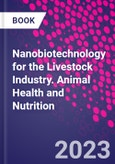Nanobiotechnology for the Livestock Industry: Animal Health and Nutrition delivers a multidisciplinary reference of nanobiotechnology applications in various sectors, including farming practices, healthcare and breeding practices, market and economic analysis/benefits, biosafety, regulation, and more. The book explores nanobiotechnology's role in livestock handling, including hygiene maintenance and feed/nutrient delivery. The book also examines nanobiotechnology's role in maintaining nutrient quality in food products, and covers healthcare practices utilizing nanobiotechnology, such as maintaining and monitoring livestock health, diagnosis and treatment of disease, monitoring drug delivery, optimizing breeding patterns, and cryopreservation of sperm and eggs.
Please Note: This is an On Demand product, delivery may take up to 11 working days after payment has been received.
Table of Contents
1. Introduction: Nanobiotechnology for Livestock Industry2. Advances in livestock handling practices
3. Role of nanobiotechnology in maintaining a hygienic environment for the livestock
4. Role of nanobiotechnology in maintaining a sterile environment for the livestock care management people
5. Biological nanocarriers for nutrient delivery
6. Potentialities of nanobiotechnology in nutrient management in the livestock products
7. Introduction to numerous diseases of the livestock
8. Nanobiotechnology potential for creating various diagnostic approaches for diseases in livestock
9. Nanobiotechnology potentialities for the treatment of various livestock diseases
10. Role of Nanomedicine for targeted drug delivery in livestock
11. Advances in nanobiotechnology for improving traditional veterinary medicines
12. Breeding technologies utilizing nanobiotechnology
13. Bionanomaterials utility for enhancing fertility
14. Nanobiotechnological in advancements in reproductive biotechnology
15. Potentialities of nanobiotechnology for creating preservatives for packaging
16. Livestock industry market trend and analysis
17. Patents based on nanobiotechnology applications in the livestock industry
18. Advantages of using nanobiotechnology in enhancing the economic status of the country
19. Biosafety aspects in nanobiotechnology for livestock industries utility
20. Bioregulation of nanobiotechnological based products
21. Ethical issues regarding the use of nanobiotechnology-based products
22. Prospects of nanobiotechnological applications for the livestock industry
Authors
Ravindra Pratap Singh Assistant Professor in the Department of Biotechnology, Indira Gandhi National Tribal University, India.Dr. Singh received his B. Sc. from Allahabad University India and his M.Sc and Ph.D. in Biochemistry from Lucknow University, India. He is currently working as an Assistant Professor in the Department of Biotechnology, Indira Gandhi National Tribal University, India. His work and research interests include biochemistry, biosensors, nanobiotechnology, electrochemistry, material sciences, and biosensors applications in biomedical, environmental, agricultural and forensics sciences.
Charles Oluwaseun Adetunji Full Professor and Lecturer in the Microbiology Department at Faculty of Sciences, Edo State University Uzairue (EDSU), Nigeria.Prof. Charles Oluwaseun Adetunji is a full Professor at the Department of Microbiology, Faculty of Sciences and the Director of Research and Innovation, Edo State University Uzairue (EDSU), Edo State, Nigeria. He formerly served as the Acting Director of Intellectual Property and Technology Transfer, Head of the Department of Microbiology, and Sub Dean of the Faculty of Science. Currently, he holds the positions of Chairman of the Grant Committee and Dean of the Faculty of Science at EDSU.
Prof. Adetunji is a Fellow of the Royal Society of Biology in the UK. Additionally, he serves as a Visiting Professor and the Executive Director of the Center for Biotechnology at Precious Cornerstone University, Nigeria. His research centers on applying biological techniques and microbial bioprocesses to achieve Sustainable Development Goals (SDGs) and contribute to advancements in agriculture.
Ram Lakhan Singh Vice-Chancellor, Nilamber-Pitamber University, Medininagar, Jharkhand, India. Professor Ram Lakhan Singh is Vice-Chancellor of Nilamber-Pitamber University, Medininagar, India. He held position of Professor and Chair of Biochemistry at Dr. Rammanohar Lohia Avadh University, Ayodhya, India prior to joining this assignment. He has 31 years of experience as teacher and 39 years as researcher in the area of Environmental and Nutraceutical Biochemistry. Professor Singh published more than 87 research papers, written 17 book chapters and edited 6 books published by Springer, CRC and Elsevier. He guided 25 PhD students and has been invited as editorial board member of International journals. He has been awarded IUTOX Senior Fellowship in 2007 and admitted to the Fellowships of the Society of Toxicology in 2011 and Academy of Environmental Biology in 2015. Jay Singh Assistant Professor at the Department of Chemistry, Institute of Sciences, Banaras Hindu University, India.Dr. Jay is an Assistant Professor at the Department of Chemistry, Institute of Sciences, Banaras Hindu University, India, since 2017. He received his Ph.D. degree in Polymer Science from Motilal Nehru National Institute of Technology in 2010 and did MSc and BSc from Allahabad University, India. He is actively engaged in the development of nanomaterials (CeO2, NiO, rare-earth metal oxide, Ni, Nife2O4, Cu2O, Graphene, RGO etc.), based nanobiocomposite, conducting polymer and self-assembled monolayers based clinically important biosensors for estimation of bioanalaytes such as cholesterol, xanthine, glucose, pathogens and pesticides/toxins using DNA and antibodies. He is actively engaged in fabricating metal oxide-based biosensors for clinical diagnosis, food packaging applications, drug delivery, and tissue engineering applications.
Pratima R. Solanki Assistant Professor, Special Centre for Nanoscience, Jawaharlal Nehru University, New Delhi, India. Pratima Solanki is Assistant Professor at Special Centre for Nanoscience at Jawaharlal Nehru University, New Delhi. She received her Master and Ph.D. degree from Maharishi Dayanand University, Rohtak, Haryana. She worked at Biomedical Instrumentation Section, National Physical Laboratory, Council of Scientific Industrial Research, New Delhi. She has published around 175 research papers in National and International Journals, 15 International book chapters and has filed 15 Indian patents. She is actively engaged in the research and development of biosensors utilizing nanostructured materials for healthcare and environmental monitoring. She has received Visitor Award 2019 from President of India. Kshitij RB Singh Research Scholar at the Graduate School of Life Science and Systems Engineering, Kyushu Institute of Technology, Fukuoka, Japan.. Kshitij RB Singh obtained his MSc in Biotechnology from Indira Gandhi National Tribal University, India. Currently, he is a doctoral student in the laboratory of Professor Shyam S. Pandey at the Department of Life Science and Systems Engineering, Kyushu Institute of Technology, Japan. His research interests encompass a range of fields, including biotechnology, biochemistry, nanotechnology, nanobiotechnology, biosensors, and materials sciences.







